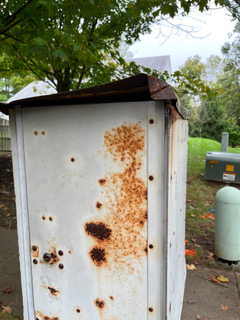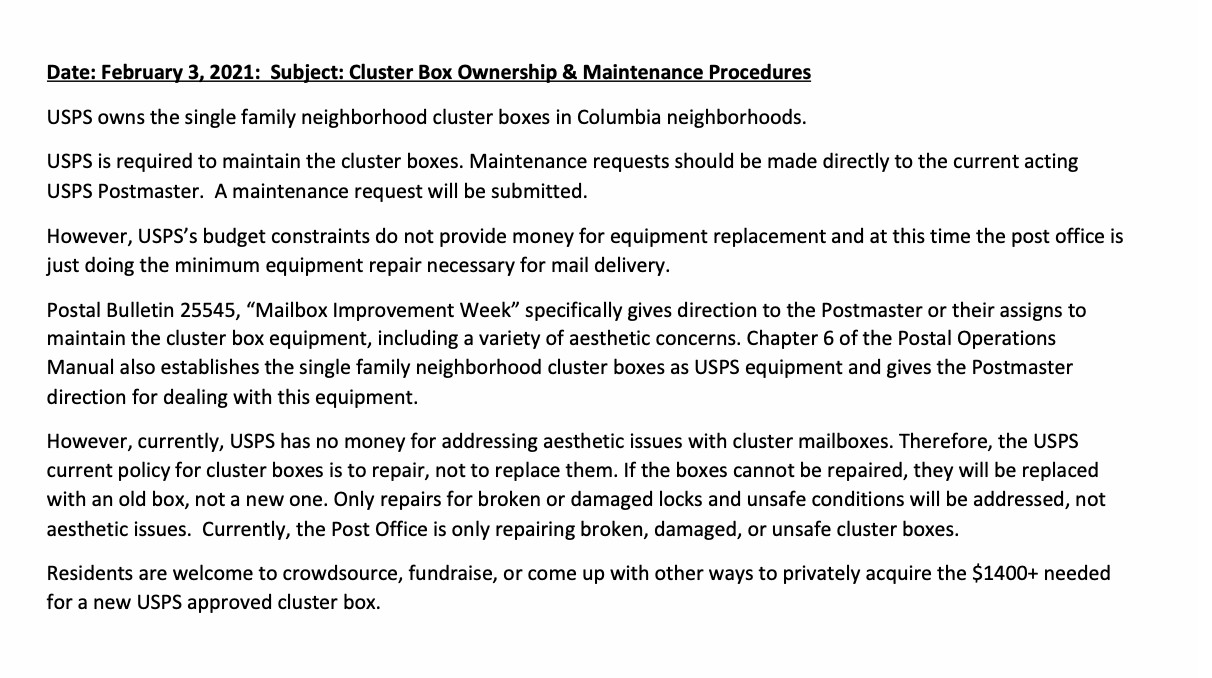Missing the Point – Still pressing the USPS. Privatizing the Post Office, Part 3
According to the 21st Century Postal Worker website, $79.5 billion on Bike Girl’s t-shirt is what the United States Post Office spent for operations just last year, in fiscal 2022. That’s an extended rate of $1 trillion every 12.57 years.
Are there any of you out there who seriously believe that we’ll be getting our money’s worth for those trillion dollars? Or, like me, do you think it’s high time we shut down the US Postal Service in favor of a privately managed alternative that, for substantially less money, delivers superior postal services that are consistent with the requirements and technology of our times?
For more than a year now, I’ve been pressing the Postal Service to replace the Cluster Mailbox Unit (CBU) that serves the families on our Columbia/Ellicott City, Maryland cul-de-sac. It’s been a slow struggle against a financially strapped independent federal government agency that couldn’t care less and can’t afford to honor its obligations to the people it was created to serve.
For the record, my problem isn’t with the handlers, mailmen and women, counter service personnel and other staff who are the heart of our postal service. My problem is with USPS management.
The total cost of a new cluster mailbox would be between $1500 and $2000, plus installation, to be incurred by the owner of the box – and therein lies the problem. The Columbia Association (CA) thinks the USPS owns our CBU. The Post Office, on the other hand, waffles between admitting to ownership and denying it depending upon who’s listening. The Post Office’s problem is that telling the truth will cost them money, literally millions of dollars, they can’t afford to spend.
The image below is the CBU in question. Note that the lid is torn up. Rust is everywhere and there are sharp edges which are problematic for kids playing in the area. What’s not shown are its wobbly legs. The picture was taken by the author. I live nearby, but that’s not my house in the background.

To be clear, if this were only my problem… If this were only about the Post Office’s refusal to replace a single cluster mailbox for the benefit of a handful of families, I wouldn’t be writing about it and it wouldn’t be worth the read. In fact, there are hundreds, if not thousands of other families in Columbia alone that have the same or similar problems.
More importantly, the Post Office’s failure to replace this one mailbox is representative of a much larger problem. It’s symbolic of a public service and bureaucracy that has long outlived their value and should be privatized and re-envisioned – using the current postal labor force to the maximum extent possible – without further delay.
It is also about the advisability of our government’s dependence upon “independent agencies.”
Although the USPS answers to Congress, the agency is, for the most part, independent of political influences. Presumably, that was the rationale for creating this special class of government organizations. “Independent” is the key word. The hope was that they could do their jobs, and fulfill their purposes without being distracted by partisan politics. In reality, the result of this independence has been to make some of them – most notably, the USPS and Federal Reserve – unresponsive to the constituency they serve. In the case of the Fed, enormous power to influence the economy of the United States has been conveyed to a literal handful of unelected officials doing whatever they want with reckless abandon for jobs lost and families destroyed. The USPS has no such power. They’re just an agency wasting billions of dollars doing a bad job of providing an outdated, generally unnecessary service.
At the core of my personal dispute with the Post Office is the question of who owns these Cluster Mailbox Units and is therefore responsible for their maintenance and occasional replacement. In the beginning, when I first approached the Post Office about replacing our cluster mailbox, they freely admitted to owning it. Not to owning all CBUs, many if not most of which are owned by homeowners’ associations having been paid for by their developers, but to owning our mailbox in particular given that we live in Columbia, Maryland. …Why’s that? Because, as you’re about to learn, Columbia has a very special place in the history of cluster mailboxes.
Since these early exchanges with the Post Office, it has been its position that it does not own any Cluster Mailbox Units, wherever they might be, period.
In response to this denial of ownership – and through a very helpful constituent services specialist working for our Congressman, John Sarbanes – I gave the Post Office notes, provided to me by the Columbia Association, describing a February 3, 2021 meeting between the CA and representatives of the Postal Service.
According to the cover email to which the notes were attached, the meeting was “between CA management and a representative of the local USPS regarding the maintenance of the neighborhood mailboxes.” Here, in its entirety, is the attachment to the email from the CA…

Note, in the first line, that the “USPS owns the single family neighborhood cluster boxes in Columbia neighborhoods.” The Post office admits to ownership, but is financially strapped and can’t honor its responsibilities as the owner. …Not my problem. If the Post Office can’t afford to maintain and replace its Cluster Mailbox Units, it should talk to Congress and ask for more money.
Keep in mind that the Columbia Association has repeatedly and consistently affirmed that never, in the 50-year history of our community, has it purchased, maintained or replaced any cluster mailboxes for what, as of 2020, are the 105,412 people who live here. I believe them. The Post Office, on the other hand, has both claimed and then denied ownership depending upon who you talk to and the circumstances of those conversations.
Notwithstanding the notes on the February 3, 2021 meeting and without even showing Congressman Sarbanes’ office the courtesy of commenting on their accuracy, the Post Office continued to assert that it does not own our CBU.
My next step was to involve constituent services from Senator Cardin’s office. Working together, representatives from both Mr. Sarbanes and Mr. Cardin’s offices raised the issue of our cluster mailbox at a previously scheduled meeting with Post Office officials last month. In response, the Post Office gave us a previously issued, standard form statement denying ownership. We’d been blown off, again.
Without comment or other evidence, without explanation of any kind, the Post Office has chosen to ignore the notes from the CA on their February 3, 2021 meeting and continues to deny ownership of the Columbia CBUs. Post Office management makes this assertion and gets away with it because, for all practical purposes, it can. It’s just that simple. This is what an independent agency can do.
Post Office management knows Congress is dysfunctional. Why be honest? Why be respectful? Why honor your obligations to your constituents if there is no authority to which you answer, and no consequences for bad behavior? You run an agency that is hemorrhaging cash, losing billions of dollars a year. You’re in trouble and you clearly don’t know what to do about it. All that matters to the Post Office are its financial problems – and the probable implications for the continued employment of management if those problems are not resolved.
Since receiving this latest denial of ownership – and with the assistance of an extremely helpful Archivist at the Columbia Association Archives – I’ve obtained a copy of an “intra-office memorandum” between executives of the Rouse Company. James Rouse was the principal creator and founder of Columbia. It’s dated December 9, 1966, and begins with the following paragraph…
Last week, I had a meeting with five gentlemen from the Federal Post Office Department. The people included were members of the General Council, Research Engineering, Bureau of Operations, and the architectural advisor. They have come to us to ask us to participate in an experimental private project that will be sponsored and followed through by the Post Office Department.
Notice who came to whom with their proposal. For an experiment to be funded by the Postal Service, not by the mandatory purchase of cluster mailboxes by the people receiving mail.
As it turns out, the “experimental private project” the Post Office was proposing was the first use of Cluster Mailbox Units in the United States, the stated purpose of which was to save the Post Office the time and expense of having to make door-to-door deliveries.
So, Columbia is where the use of cluster mailboxes started, first experimentally and then on a regular, very widespread basis. Since seeing this 1966 document, one thing has led me to another and, more specifically, to a June 1987 GAO (United States General Accounting Office) “Report to Congressional Requestors” entitled “POSTAL SERVICE,” subtitled “Mail Delivery to New Residential Addresses: Adherence to Policy Can Be Improved.”
Quoting from page 7 of this GAO report…
The <Postal> Service conducted an experimental program delivering mail to cluster boxes from 1967 to 1975. During that period the Service purchased, installed, and maintained cluster boxes. This program was suspended by the Postal Reorganization Act Amendments of 1976 which placed a moratorium on the Service installing cluster boxes in new housing areas. The congressional concern was that delivery to cluster boxes represented a reduction in mail delivery service.
After the moratorium expired in March 1977, the Service continued to encourage mail delivery to cluster boxes but with the boxes being purchased and installed by customers. This arrangement apparently proved to be ineffective in promoting the use of cluster boxes. In December 1980, the Service proposed that postal regulations be modified to allow the Service to encourage the acceptance and continued use of cluster boxes by agreeing to purchase, install, maintain, and replace the boxes. The proposed modification was finalized by publication in the March 5, 1981, Federal Register.
The final rule authorized the Service to procure, install, maintain, and replace cluster mailboxes when it determined that it would improve the efficiency of mail delivery.
The bolding in the above-excerpted text is mine. There has never been any disagreement that cluster mailboxes very significantly reduce the costs of delivering the mail.
Notice that there is no mention of Columbia, the implications being that the Post Office might not only own our mailboxes, but also cluster mailboxes elsewhere in the state and country. Can you imagine the cost to the Post Office of eventually having to replace all the CBUs in the United States? And the potential of our having to underwrite those millions and millions of dollars out of our own pockets or tax dollars better spent for other essential government programs?
Could it be that the Post Office has changed its policy since the GAO report, fifty-three years ago? That it no longer purchases, maintains and replaces CBUs at its expense? Not even in Columbia? That whatever special agreement the Post Office may have had with the Columbia Association has expired, retrospectively to convey ownership of all Columbia CBUs to the CA? …Sure it’s possible, but where’s the proof which should be easy enough for the Post Office to produce? And so, in the interest of doing the right thing, whatever the implications, let me encourage the Post Office to offer hard evidence that it does NOT own Columbia’s Cluster Mailbox Units. And let the truth speak for itself.
My own research continues with efforts to find a definitive agreement – not just notes on a meeting – between the Columbia Association and the Post Office and to pursue multiple FOIA (Freedom of Information Act) requests – to both the USPS and PRC for agreements and law germane to the Post Office’s ownership of CBUs in Columbia, MD.
FYI, the PRC (Postal Regulatory Commission) is yet another independent agency that provides oversight and supervision to the US Postal Service – further separating the latter from our elected representatives in Congress.
Any comments and advice you can offer will be greatly appreciated.

Les Cohen is a long-term Marylander, having grown up in Annapolis. Professionally, he writes and edits materials for business and political clients from his base of operations in Columbia, Maryland. He has a Ph.D. in Urban and Regional Economics. Leave a comment or feel free to send him an email to [email protected].

